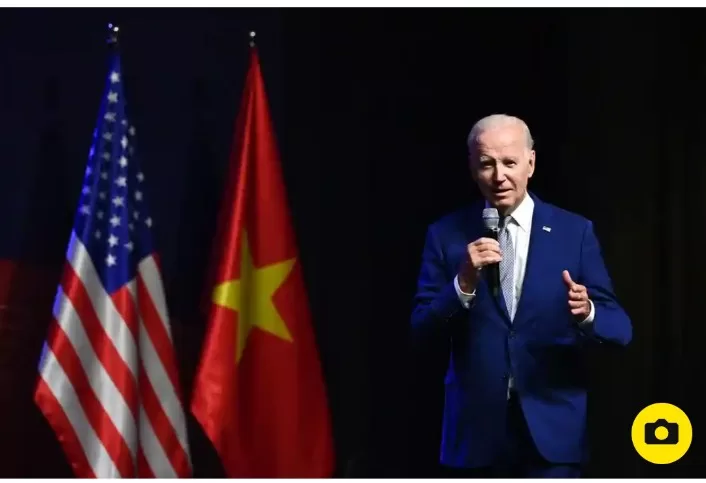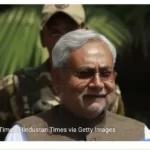President Joe Biden embarked on a comprehensive national security tour across Southeast Asia, making a significant stop in Hanoi, Vietnam, on Sunday. During this crucial leg of his journey, the President underscored the paramount importance of maintaining stability in the complex diplomatic landscape of the region.
“I don’t seek to contain China,” President Biden affirmed, “Rather, my objective is to establish a transparent, mutually beneficial relationship with China, one that is clearly defined and understood by all parties involved.”
In addition, President Biden assessed that China’s recent economic challenges could potentially diminish any aspirations for military action concerning Taiwan. “I don’t believe the current economic situation in China is conducive to an invasion of Taiwan. In fact, it might have the opposite effect, as China’s capacity for such actions may be more limited now,” he stated during a press conference in Hanoi on Sunday.
The President’s comments came in the wake of a strategic meeting with Nguyen Phu Trong, the General Secretary of Vietnam’s ruling Communist party. The primary aim of this meeting was to secure global supply chains for semiconductors and critical minerals, thereby providing an alternative to China in this vital sector.
President Biden expressed optimism about the opportunities arising from his visit, asserting, “I firmly believe that this visit underscores the immense potential in the partnership between Vietnam and the United States, particularly in these critical times.”
This meeting with Vietnam transpired amidst a multifaceted diplomatic effort to garner international support for Ukraine in the face of Russia’s invasion, while concurrently defining a US-China policy that fosters trade and mitigates the likelihood of conflicts between the two superpowers.
However, the complexities of this diplomatic balancing act were starkly illustrated on the eve of President Biden’s arrival in Hanoi. Reports from The New York Times revealed that Vietnam is engaged in discussions with Russia regarding a prospective arms supply agreement. This development has the potential to trigger sanctions imposed by the United States.
Additionally, during the G20 summit held in New Delhi, India, Western leaders refrained from issuing a direct condemnation of Russia’s actions in Ukraine. The summit declaration referred only to the “war in Ukraine” and expressed concern over the “suffering” endured by the Ukrainian populace. This equivocal stance signifies a diminishing international consensus on the matter.
It is noteworthy that less than a year ago, G20 leaders unequivocally condemned Russia’s invasion and urged Moscow to withdraw its forces from Ukraine.
In response to these events, Secretary of State Antony Blinken sought to address the apparent discord, asserting on ABC’s This Week that world leaders at the New Delhi summit had “vigorously endorsed Ukraine’s sovereignty and territorial integrity” in their statement.
Furthermore, Blinken emphasized that virtually all participants at the summit were resolute in their determination to facilitate a just and enduring resolution to the Russian aggression. He conveyed the consensus within the room that “nations are experiencing the repercussions and are keen to see an end to Russia’s aggression.”
White House Press Secretary Karine Jean-Pierre reinforced this perspective by stating, “The vast majority of G20 nations have endorsed multiple UN resolutions condemning Russia’s unlawful aggression.”
Jean-Pierre explained that the New Delhi communique built upon this consensus, conveying an unprecedented unified message that calls upon Russia to refrain from employing force for territorial gain, adhere to its UN Charter commitments, and halt attacks on civilians and infrastructure.
However, amidst these diplomatic efforts, a CBS News poll revealed that only one in four Americans perceives President Biden as enhancing the United States’ global standing. According to the survey, a mere 24% believed that President Biden was strengthening the nation, while 50% believed he was weakening it, and 26% opined that his impact was minimal.
Furthermore, the poll indicated that just 29% of respondents felt optimistic about the prospects for global peace and stability, with a staggering 71% expressing increased pessimism. When asked whether the Biden administration was adopting an overly lenient stance towards China, 57% concurred.
On CNN, Republican presidential hopeful Nikki Haley vehemently criticized the Biden administration’s approach to China, characterizing the nation as an “adversary.” Haley contended, “China has been preparing for a potential conflict with the United States for years. Yes, I see China as an adversary.”
Haley pointed to China’s substantial land acquisitions in the United States, including the purchase of 400,000 acres (162,000 hectares), and its acquisition of the country’s largest pork producer. She also highlighted China’s continuous theft of intellectual property, amounting to $600 billion annually, alongside its dissemination of propaganda. Haley drew attention to the utilization of Chinese drones by American law enforcement agencies and the grave crisis stemming from Chinese-sourced fentanyl, responsible for more American casualties than the combined toll of the Iraq, Afghanistan, and Vietnam wars.
Haley questioned the Biden administration’s approach to China, particularly the recent visit of US Commerce Secretary Gina Raimondo to Beijing, stating, “How many more indicators must arise for President Biden to comprehend that we should not be appeasing China?”
President Biden’s administration continues its endeavor to articulate a coherent foreign policy stance towards its most complex challenges, encompassing China and Russia. This effort persisted as Vice-President Kamala Harris cautioned against the proposed meeting between North Korea’s Kim Jong-un and Russia’s Vladimir Putin, deeming it a “significant error.”
Harris pointed to Russia’s unprovoked aggression against Ukraine and expressed concern over the consequences of providing ammunition to Russia in this context. She asserted, “Given Russia’s ongoing aggression and unprovoked war against Ukraine, supplying further weaponry to Russia would have foreseeable consequences. I firmly believe that this move will isolate both Russia and North Korea further.”
Moreover, Harris raised the apprehension that China’s President, Xi Jinping, who notably declined to attend the G20 summit, might also abstain from participating in the upcoming Asia-Pacific Economic Cooperation (APEC) leaders’ meeting in San Francisco, California, slated for November.
Notably, China’s security agency insinuated that Xi Jinping’s potential meeting with President Biden in San Francisco would be contingent upon the United States demonstrating sufficient sincerity in its approach. The Chinese Ministry of State Security emphasized China’s unwavering vigilance in this regard.
These developments transpired after Secretary Raimondo acknowledged American companies’ grievances regarding the increasing risk of investment in China. While she asserted that the United States did not seek to decouple from China, she acknowledged the challenges posed by the perception that China had become an “uninvestable” destination.
When asked about the significance of President Xi Jinping’s visit to the United States, Vice-President Harris underscored the importance of maintaining open channels of communication, stating, “It is imperative for the stability of global affairs that we continue to foster open lines of dialogue.”







